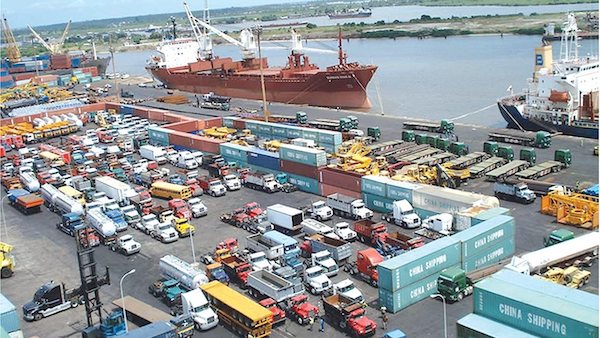Business
U.S. identifies corruption, trade barriers as major challenges to investment in Nigeria

The United States government has once again raised serious concerns over the persistent barriers to trade and investment in Nigeria.
The agency identified corruption, lack of transparency, and restrictive regulations as key obstacles to investment in Africa’s most populous nation.
In its 2025 National Trade Estimate Report on Foreign Trade Barriers, released on March 1, the Office of the United States Trade Representative (USTR) detailed a wide range of issues hampering American businesses operating in Nigeria.
The report was seen by media on Monday.
The report paints a sobering picture of the investment climate in Africa’s largest economy, where systemic inefficiencies continue to frustrate both local and foreign investors.
According to the USTR, corruption remains a major challenge. U.S. companies doing business in Nigeria frequently encounter inappropriate demands for “facilitative” payments from officials, creating daily operational hurdles. Efforts to strengthen Nigeria’s anti-corruption framework, the report noted, have often been undermined by inter-ministerial conflicts and partisan politics.
“Questions also remain regarding the Nigerian justice system’s capacity to achieve convictions and appropriate sentencing for corruption-related crimes,” the USTR added, highlighting widespread doubts about the effectiveness of the country’s judicial processes.
Beyond corruption, the report criticised Nigeria’s sluggish handling of U.S. agricultural imports. Despite repeated attempts since 2019 to negotiate approvals for various food and agricultural products, Nigerian authorities have been slow to act, effectively closing off a valuable market to American exporters.
The report further pointed to Nigeria’s weak infrastructure for certificate review, goods inspection, and product testing, which has contributed to significant customs clearance delays. Many traders, it observed, have been forced to turn to informal channels to move their goods.
Sanitary and phytosanitary regulations, which are meant to safeguard public health, are also inconsistently applied in Nigeria, creating confusion among exporters and further complicating trade procedures.
READ ALSO: Keyamo confirms reopening of Akanu Ibiam Airport ahead of schedule
The USTR did not shy away from criticizing Nigeria’s broader import regime either. Although the country’s average Most-Favoured Nation tariff rate stood at 12 percent in 2023, agricultural imports faced a steeper rate of 15.9 percent, while non-agricultural goods attracted an 11.4 percent rate. Supplementary import charges significantly push the actual cost of importing goods even higher, in some cases surpassing limits agreed under ECOWAS rules.
In addition, Nigeria continues to enforce import bans on 25 different categories of goods, including poultry, beef, spaghetti, fruit juice in retail packs, and used vehicles older than 12 years. The USTR described these bans as major barriers to trade.
Problems within Nigeria’s customs administration also featured prominently in the report. Importers reported frequent inconsistencies in customs regulation enforcement, lengthy clearance procedures tied to outdated manual systems, and rampant corruption. Although the Nigerian government approved a $3.1 billion customs modernisation project in 2020, the initiative has suffered repeated delays and is now mired in legal disputes.
When it comes to public procurement, U.S. companies reportedly face difficulties accessing Nigerian government contracts, with concerns over a lack of transparency and irregular contract payment practices. In many cases, agencies fail to adhere to procurement guidelines, despite existing requirements for oversight from the Bureau of Public Procurement.
The USTR acknowledged some progress, such as the passage of the Copyright Act in 2022, but said enforcement remains weak. Counterfeit goods ranging from pharmaceuticals to automotive parts are still widely available, posing significant risks to consumer safety.
In the digital economy, concerns persist over Nigeria’s localisation rules, which require all data on Nigerian citizens to be stored within the country. Though enforcement has been patchy, the guidelines continue to create uncertainty for technology firms. The Finance Acts of 2020 and 2021, which introduced new taxes on foreign digital services, have also drawn criticism from U.S. companies.
The report highlighted further restrictions in Nigeria’s reinsurance and advertising sectors, including prohibitions on foreign involvement in oil and gas risk reinsurance and mandatory local registration of advertisements.
While it noted that the Central Bank of Nigeria’s 2023 foreign exchange reforms were a positive step, including the unification of exchange rates and lifting of forex restrictions on 43 previously barred items, challenges persist. Delays and denials in fund repatriation continue to discourage U.S. investors. As of March 2024, the Central Bank had reportedly cleared $4.6 billion of a $7 billion forex backlog, leaving $2.4 billion still under review.
Nigeria’s main ports, particularly Apapa in Lagos, were also singled out. According to the USTR, congestion, infrastructure deficiencies, and maritime insecurity have made Apapa one of the most expensive ports for U.S. shipments, with an average delay of 30 days to clear container vessels.
Although the establishment of a Ministry of Marine and Blue Economy has been hailed as a step toward improving port efficiency, the USTR concluded that “barriers that restrict trade and limit investment in Nigeria remain widespread.”
Join the conversation
Support Ripples Nigeria, hold up solutions journalism
Balanced, fearless journalism driven by data comes at huge financial costs.
As a media platform, we hold leadership accountable and will not trade the right to press freedom and free speech for a piece of cake.
If you like what we do, and are ready to uphold solutions journalism, kindly donate to the Ripples Nigeria cause.
Your support would help to ensure that citizens and institutions continue to have free access to credible and reliable information for societal development.




























